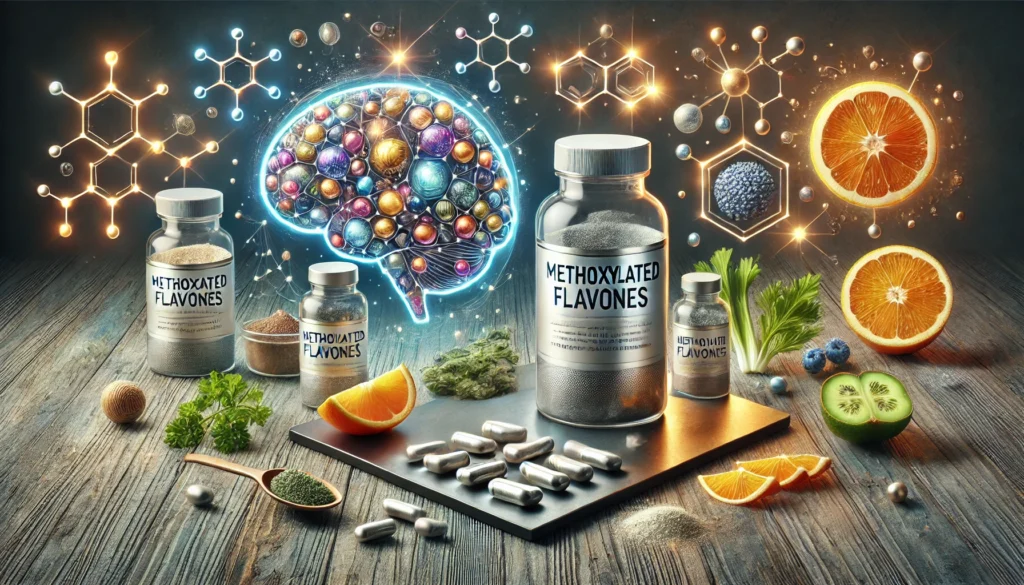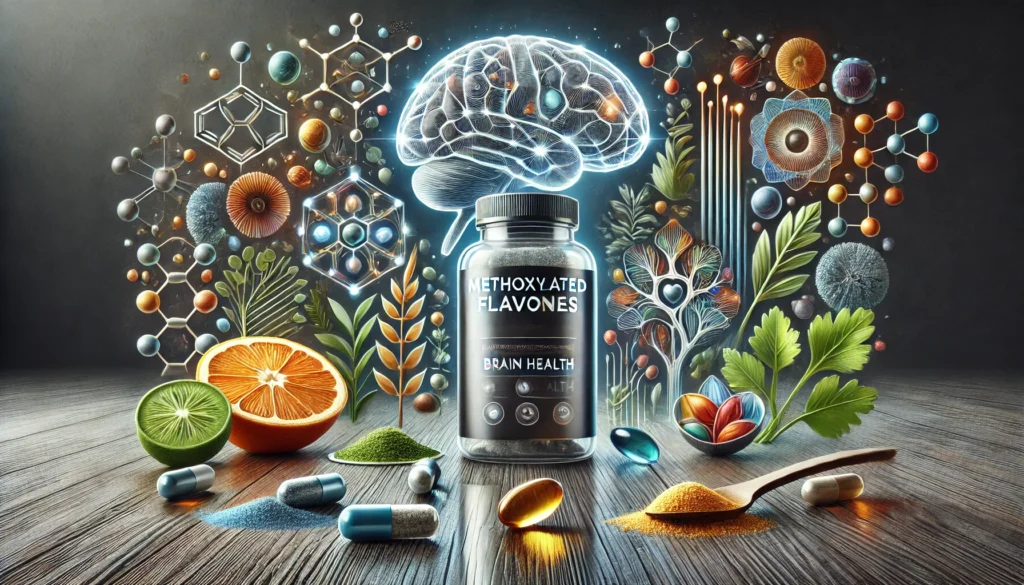Methoxylated flavones are a class of compounds found naturally in certain plant species. They are a subgroup of flavonoids, which are known for their antioxidant, anti-inflammatory, and neuroprotective properties. Increasingly, methoxylated flavones are being explored for their potential to enhance cognitive performance, making them a popular subject of interest in the realm of nootropic supplements. This article provides a comprehensive examination of methoxylated flavones, focusing on their chemistry, physiological effects, nootropic potential, dosing guidelines, possible side effects, and interactions with other supplements and medications.
You May Also Like:
Sources of Methoxylated Flavones
Methoxylated flavones can be found in a variety of plant sources, particularly in herbs and medicinal plants. These compounds are typically present as a natural component of the plant’s defense mechanism against oxidative stress, pathogens, and environmental factors. Common sources include:
- Bitter orange (Citrus aurantium): A well-known source of methoxylated flavones like synephrine, which is primarily used for weight management and energy.
- Hops (Humulus lupulus): Contains methoxylated flavones such as xanthohumol, which is researched for its antioxidant and neuroprotective effects.
- Passionflower (Passiflora spp.): Contains methoxylated flavones such as vitexin and is often used for its calming effects, which may indirectly enhance cognitive function by reducing stress.
- Citrus fruits: Although not the primary source, citrus flavonoids can contain some methoxylated variants that contribute to overall antioxidant effects.
In addition to these natural sources, methoxylated flavones are also available as isolated compounds in supplement form, often marketed for their cognitive-enhancing, mood-regulating, and anti-aging properties.

Chemistry of Methoxylated Flavones
Methoxylated flavones are flavonoids that have one or more methoxy (-OCH₃) groups attached to their flavonoid backbone. This modification significantly alters their biological properties, making them more lipophilic (fat-soluble) and enhancing their ability to cross the blood-brain barrier. The methoxy group increases the stability and potency of the flavones, which may contribute to their more pronounced effects on the brain and nervous system.
Flavonoids, in general, are composed of a flavone backbone—a structure characterized by a 15-carbon skeleton (C6-C3-C6) made up of two aromatic rings. The methoxy group can be attached to any of the hydroxyl groups present in the flavone structure, modifying the compound’s activity and efficacy. This modification can also alter the compound’s ability to interact with different enzymes, receptors, and signaling pathways in the body.
In the case of methoxylated flavones like xanthohumol from hops or synephrine from bitter orange, these compounds exhibit enhanced bioavailability and may have stronger antioxidant and anti-inflammatory effects than their non-methoxylated counterparts.
Physiological Mechanisms of Methoxylated Flavones in the Body and Brain
Methoxylated flavones, due to their antioxidant, anti-inflammatory, and neuroprotective properties, exert several physiological effects that may influence brain function and cognitive performance. Below are the key mechanisms through which these compounds work:
1. Antioxidant Activity
Methoxylated flavones are potent antioxidants that help neutralize free radicals and reactive oxygen species (ROS) in the brain. Free radicals are unstable molecules that can cause cellular damage and are implicated in various neurological conditions, such as Alzheimer’s disease, Parkinson’s disease, and age-related cognitive decline. By reducing oxidative stress, methoxylated flavones help protect neuronal cells from damage and support brain health.
2. Anti-inflammatory Effects
Chronic inflammation in the brain, often referred to as neuroinflammation, is a key contributor to cognitive decline and neurodegenerative diseases. Methoxylated flavones, through their anti-inflammatory properties, can reduce the levels of pro-inflammatory cytokines and other inflammatory mediators. This modulation of the inflammatory response is thought to contribute to their neuroprotective effects, supporting better cognitive function and potentially reducing the risk of diseases like Alzheimer’s and multiple sclerosis.
3. Neuroprotective Effects
Methoxylated flavones are believed to act as neuroprotectants by supporting the function and survival of neurons. These compounds may help increase the expression of certain neurotrophic factors—proteins that promote the growth, survival, and differentiation of neurons. This effect is particularly relevant in neurodegenerative diseases, where the progressive loss of neurons leads to cognitive dysfunction.
Additionally, methoxylated flavones are known to modulate the activity of key neurotransmitter systems, including those involving dopamine and serotonin. By influencing these pathways, methoxylated flavones may improve mood, attention, and overall cognitive performance.

Nootropic Benefits of Methoxylated Flavones
As nootropic supplements, methoxylated flavones are gaining popularity for their potential cognitive-enhancing benefits. The primary nootropic effects of methoxylated flavones include:
1. Enhanced Cognitive Function
Methoxylated flavones are believed to enhance cognitive performance by increasing blood flow to the brain, boosting neurotransmitter function, and protecting neurons from oxidative damage. Regular supplementation may help improve memory, learning capacity, and overall mental clarity. Research on compounds like xanthohumol (from hops) suggests that they can also promote neurogenesis—the formation of new neurons—potentially improving cognitive performance over time.
By modulating neurotransmitter systems involved in mood regulation, such as serotonin and dopamine, methoxylated flavones may help reduce symptoms of anxiety, depression, and stress. These compounds are often used in combination with other mood-regulating nootropics to improve overall emotional well-being.
3. Neuroprotection and Aging
As people age, the brain becomes more vulnerable to oxidative stress and inflammation, both of which contribute to cognitive decline. Methoxylated flavones’ potent antioxidant and anti-inflammatory effects are believed to protect the brain against the wear and tear of aging. Studies suggest that these compounds may help delay the onset of age-related neurodegenerative diseases, offering a potential therapeutic approach to maintaining brain health as one grows older.
4. Improved Physical and Mental Stamina
Methoxylated flavones, such as those derived from bitter orange, may help increase energy levels and stamina by promoting better circulation and metabolic activity. These effects could be particularly beneficial for individuals looking to improve both physical and mental performance, as the compounds may reduce fatigue and enhance endurance during mental tasks or physical activity.

Dosage and Supplementation Guidelines
The optimal dosage of methoxylated flavones depends on several factors, including the specific compound, individual health status, and the desired nootropic effect. It is important to follow recommended guidelines or consult a healthcare professional before starting supplementation.
1. General Dosage
For general cognitive enhancement and antioxidant protection, methoxylated flavones are typically taken in doses ranging from 50 to 200 mg per day. The specific dosage depends on the type of flavone being used, as well as the individual’s sensitivity to the compound.
2. Specific Nootropic Benefits
For more specific benefits, such as enhanced mood or neuroprotection, higher doses may be required. In the case of xanthohumol, for instance, doses of 100-200 mg per day have been used in clinical studies with promising results. However, supplementation with such doses should be closely monitored by a healthcare professional, as higher amounts may carry risks for side effects.
3. Supplement Forms
Methoxylated flavones are typically available in the form of capsules, tablets, or liquid extracts. The bioavailability of these compounds can vary depending on the form used, with some extracts offering enhanced absorption compared to raw plant material.
Side Effects and Safety
While methoxylated flavones are generally considered safe for most individuals, there are potential side effects and precautions to be aware of:
1. Mild Gastrointestinal Disturbances
Some individuals may experience mild digestive discomfort, including nausea or stomach upset, when first taking methoxylated flavone supplements. These effects can often be minimized by starting with a lower dose and gradually increasing it.
2. Allergic Reactions
As with any plant-derived supplement, allergic reactions may occur in sensitive individuals. Symptoms may include skin rashes, itching, or swelling. Those with known allergies to plants in the Rutaceae or Cannabaceae families (such as bitter orange or hops) should avoid methoxylated flavone supplements.
3. Potential Interactions with Medications
Methoxylated flavones can interact with certain medications, especially those that affect the central nervous system or metabolism. For instance, supplements containing bitter orange may interact with stimulants, such as caffeine or amphetamines, due to its stimulant properties. These interactions may increase the risk of side effects like anxiety or elevated heart rate.

Interactions with Other Supplements and Medications
Methoxylated flavones may also interact with other supplements, particularly those with stimulating effects. Caution should be exercised when combining methoxylated flavones with other nootropics, especially those that influence neurotransmitter systems like serotonin or dopamine. Additionally, combining methoxylated flavones with drugs that affect blood pressure or metabolism may require medical supervision.
Risks for Individuals with Certain Health Conditions
Certain individuals should exercise caution when taking methoxylated flavones, particularly those with:
- Cardiovascular issues: Methoxylated flavones, particularly synephrine from bitter orange, can increase heart rate and blood pressure, which may pose risks for individuals with hypertension or heart disease.
- Liver or kidney dysfunction: As with many supplements, those with impaired liver or kidney function may experience altered metabolism of methoxylated flavones, increasing the risk of adverse effects.
Conclusion: Should You Consider Methoxylated Flavones as a Nootropic?
Methoxylated flavones, with their powerful antioxidant, anti-inflammatory, and neuroprotective properties, hold significant promise as nootropic supplements. They can enhance cognitive performance, support mental clarity, and offer potential protection against age-related cognitive decline. However, as with any supplement, it is essential to approach methoxylated flavones with caution, especially regarding optimal dosing and potential interactions with medications or other supplements.
Given their wide range of benefits and relatively low risk profile, methoxylated flavones may be a worthwhile addition to the regimen of individuals seeking to optimize brain health. However, it is essential to consult with a healthcare provider, particularly for individuals with pre-existing health conditions or those already taking medications. By incorporating methoxylated flavones into a balanced lifestyle, individuals may experience long-term cognitive benefits and overall health improvements.

References:
- Methoxylated Flavones – Uses, Side Effects, and More. Retrieved from: https://www.webmd.com/vitamins/ai/ingredientmono-1086/methoxylated-flavones
- Methoxylated flavones, a superior cancer chemopreventive flavonoid subclass? Retrieved from: https://pubmed.ncbi.nlm.nih.gov/17574860/
- Toward understanding of the methoxylated flavonoid biosynthesis pathway in Dracocephalum kotschyi Boiss. Retrieved from: https://pmc.ncbi.nlm.nih.gov/articles/PMC8486745/
- Neuroprotection and neurodegenerative disease. Retrieved from: https://pubmed.ncbi.nlm.nih.gov/11749009/
Important Note: The information contained in this article is for general informational purposes only, and should not be construed as health or medical advice, nor is it intended to diagnose, prevent, treat, or cure any disease or health condition. Before embarking on any diet, fitness regimen, or program of nutritional supplementation, it is advisable to consult your healthcare professional in order to determine its safety and probable efficacy in terms of your individual state of health.
Regarding Nutritional Supplements Or Other Non-Prescription Health Products: If any nutritional supplements or other non-prescription health products are mentioned in the foregoing article, any claims or statements made about them have not been evaluated by the U.S. Food and Drug Administration, and such nutritional supplements or other health products are not intended to diagnose, treat, cure, or prevent any disease.


